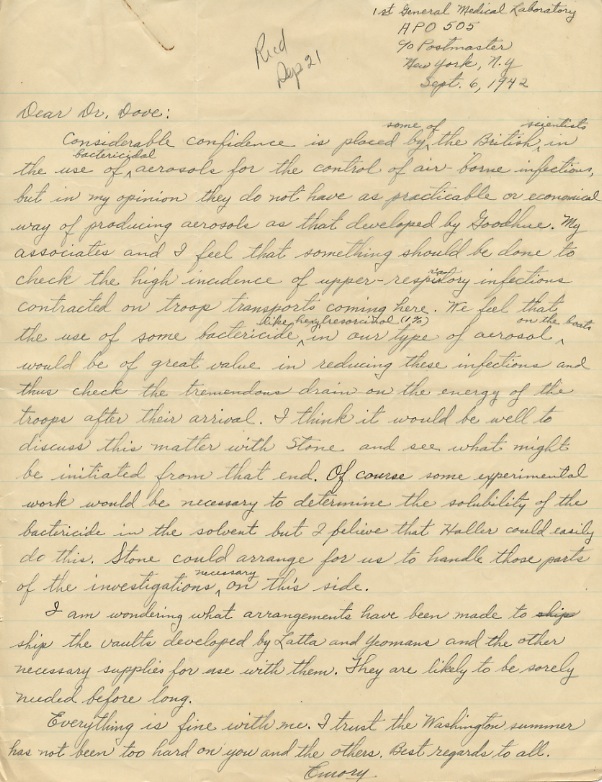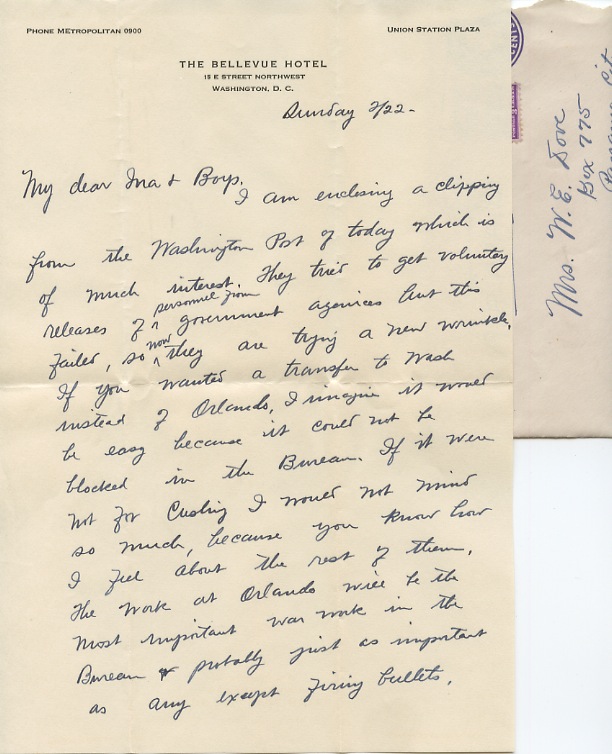Walter applied for a research position with the Public Health Service. On this application form, he answers the “Reason for desiring to change employment” question with “Unsettled conditions due to merger.”
Tag Archives: public health
September 6, 1942
1st General Medical Laboratory
APO 505
c/o Postmaster
New York, N.Y.
Sept. 6, 1942
Dear Dr. Dove:
Considerable confidence is placed by some of the British scientists in the use of bactericidal aerosols for the control of air-borne infections, but in my opinion they do not have as practicable or economical way of producing aerosols as that developed by Goodhue. My associates and I feel that something should be done to check the high incidence of upper-respiratory infections contracted on troop transports coming here. We feel that the use of some bactericide like hexylresorcinol (1%) in our type of aerosol on the boats would be of great value in reducing these infections and thus check the tremendous drain on the energy of the troops after their arrival. I think it would be well to discuss this matter with Stone and see what might be initiated from that end. Of course some experimental work would be necessary to determine the solubility of the bactericide in the solvent but I believe that Haller could easily do this. Stone could arrange for us to handle those parts of the investigation necessary on this side.
I am wondering what arrangements have been made to ship the vaults developed by Latta and Yeomans and the other necessary supplies for use with them. They are likely to be sorely needed before long.
Everything is fine with me. I trust the Washington summer has not been too hard on you and the others. Best regards to all.
Emory
February 22, 1942
Sunday 2/22.
My dear Ina & Boys,
I am enclosing a clipping from the Washington Post of today which is of much interest. They tried to get voluntary releases of personnel from government agencies but this failed, so now they are trying a new wrinkle. If you wanted a transfer to Wash. instead of Orlando, I imagine it would be easy because it could not be blocked in the Bureau. If it were not for Cushing I would not mind so much, because you know how I feel about the rest of them. The work at Orlando will be the most important war work in the Bureau & probably just as important as any except firing bullets.*
I kept the sedan delivery here today but I did not go out to Beltsville. It has been real cold yesterday & today and it was not especially urgent that I go over the fumigated material until tomorrow. I hope I can get away about the end of the week but cannot tell yet. I want to get the answer if I can by that time.
If you have any strong convictions about transferring, please let me know. After the war it may be difficult to get into other govt work which might mean taking the retirement. It would amount to about $150 per month at present. After about 6 yrs more or 30 yrs service would amount to about $200 per mo. I doubt if I could leave the Bureau before about 6 yrs. By that time we may be in the middle of another depression & it would be difficult to get started in something else.
With love,
Walter.
P.S. Think I’ll talk to the Public Health Service. Theirs should be permanent.
* Walter is not bragging. Louse-borne typhus was deadlier than any weapon in World War I, and all indications were that it would take a similar toll in this war. An army that could prevent and/or treat louse infestations would have an immense advantage over one that couldn’t.



